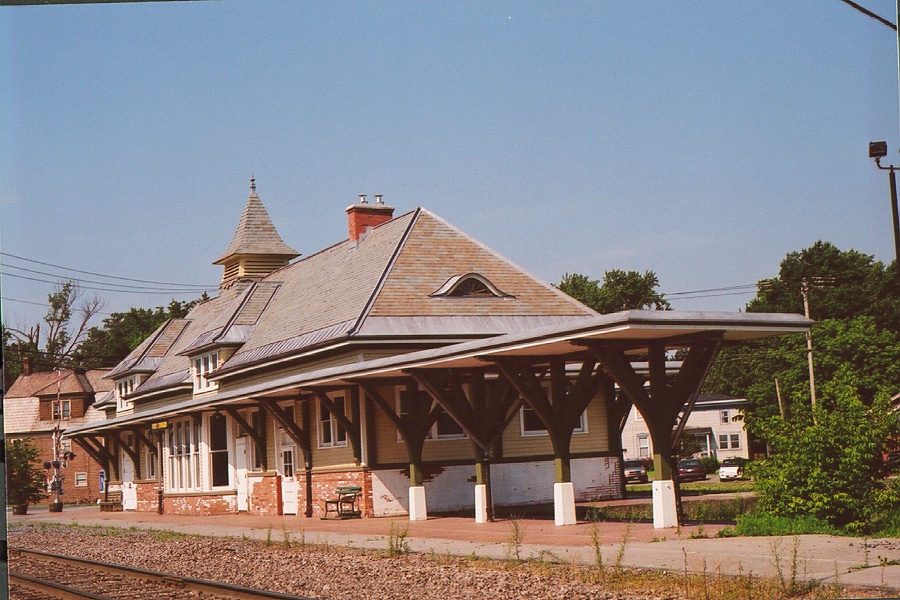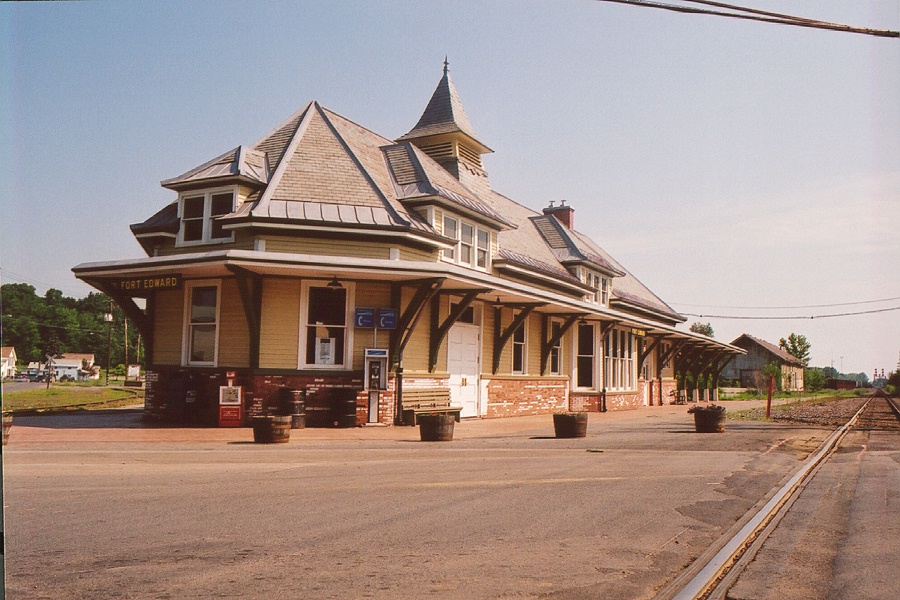Fort Edward, New York
As
1900 ended the 19th Century, and began the 20th, the
Delaware & Hudson RR opened a new depot in Fort Edward, NY. The D&H is
a very historic railroad property. It was one of the earliest railroads in the
east to exploit coal as the industrial age dawned. The railroad traces it
roots to the Delaware & Hudson Canal Company, chartered in 1823. In those
days, the canal was thought to be the ultimate in transportation, and the
D&H sought to tap the coalfields near Carbondale, Pa. linking them to the
Hudson River near Kingston, NY. By the late autumn of 1828, the canal project
was completed with some 108 locks in as many miles. A unique feature was the
use of a railroad incline plane to handle the most difficult portion of the
hilly terrain. Out of this, the D&H as a railroad was born, although the
Canal itself would survive until 1898. Of course by then, the railroad had
long since eclipsed the canal for surface transportation.
By
1875 the D&H railroad would expand all the way to Canada with the
completion of its own line north from Saratoga. The geographic gap was filled
by existing railroads from Binghamton to Albany and Saratoga: the Albany &
Susquehanna RR, and the Rensselaer & Saratoga RR, which the D&H leased
in 1870 and 1871 respectively.
The
Delaware & Hudson was for many years a unique player in a crowded eastern
rail scene. Its mountainous grades south of Albany to the Pennsylvania coal
fields contrasted with its magnificently scenic route along the rock wall
cliffs above the west side of Lake Champlain. D&H connected with many of
the classic era railroads of the east: Lehigh Valley, New York, Ontario &
Western, Erie, New York Central, Boston & Maine, Canadian Pacific,
Rutland, and others. It had
branch line routes reaching into the Adirondack Mountains, to places like
North Creek and Lyon Mountain and Ticonderoga. South of its Albany
headquarters city it reached Oneonta in the bucolic Catskills.
Binghamton and Owego were on one line, and Scranton / Wilkes-Barre on
another from a junction in Nineveh as the railroad left the Catskills for the
Poconos. At Lanesboro, Pa. its tracks ducked under the famed Starrucca viaduct
of the Erie Railroad. Ararat Summit consisted of a 17.7 mile climb up a
maximum grade of 1.39 percent. This was eastern mountain railroading of a
special kind. The D&H had a fleet of Northern and Challenger type steam
locomotives to match the rugged conditions and the demands of fast merchandise
freight traffic.
Located
on D&Hís Lake Champlain route to Montreal, the Fort Edward station was
an important point for the railroad. Paper mill and lumber products, as well
as locally manufactured goods and the bridge traffic to Montreal all flowed
through Fort Edward.
The
Fort Edward station bears an architectural resemblance to other D&H depots
at Altamont and Westport. The station features brick construction to the
window sill level and then wood framing above. In typical late Victorian
fashion, it has elegant wood roof brackets and ornate roof dormers. A unique
polygonal south end formed the main waiting room area. A pyramid-capped cupola
on a slate roof completes this masterpiece of the railroad carpenter craftsmen
of the era.
A
brief but beloved era in passenger service on the D&H was the re-equipping
of the Montreal trains in 1967 with four big Alco PA diesels, arguably the
most beautiful diesels ever constructed. Rolling stock was upgraded as well
with classic stainless steel coaches and two dining cars, all painted in the
D&Hís blue and yellow paint scheme. Train numbers 34 and 35, The
Laurentians, became a favorite for railfan photographers up and down the
scenic Lake Champlain route.
Today
the station has undergone a restoration, and currently serves passengers on
Amtrakís popular Adirondack. The D&H line under CP Rail, itís new
owner, remains one of the most scenic routes in the east and is still one of
the best train rides in Amtrakís timetable.


Fort
Edward, New York. Delaware & Hudson RR
July
14, 2000 by Jon Rothenmeyer